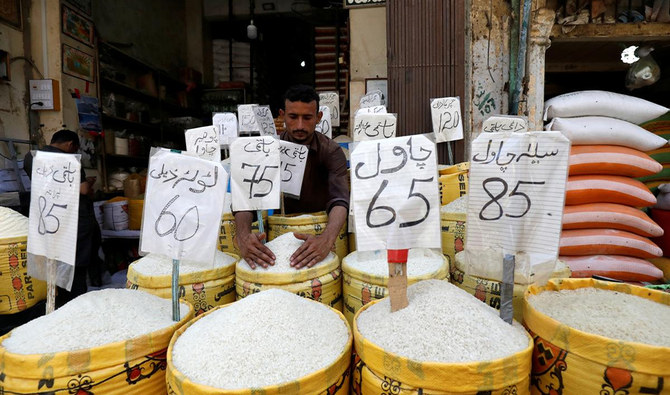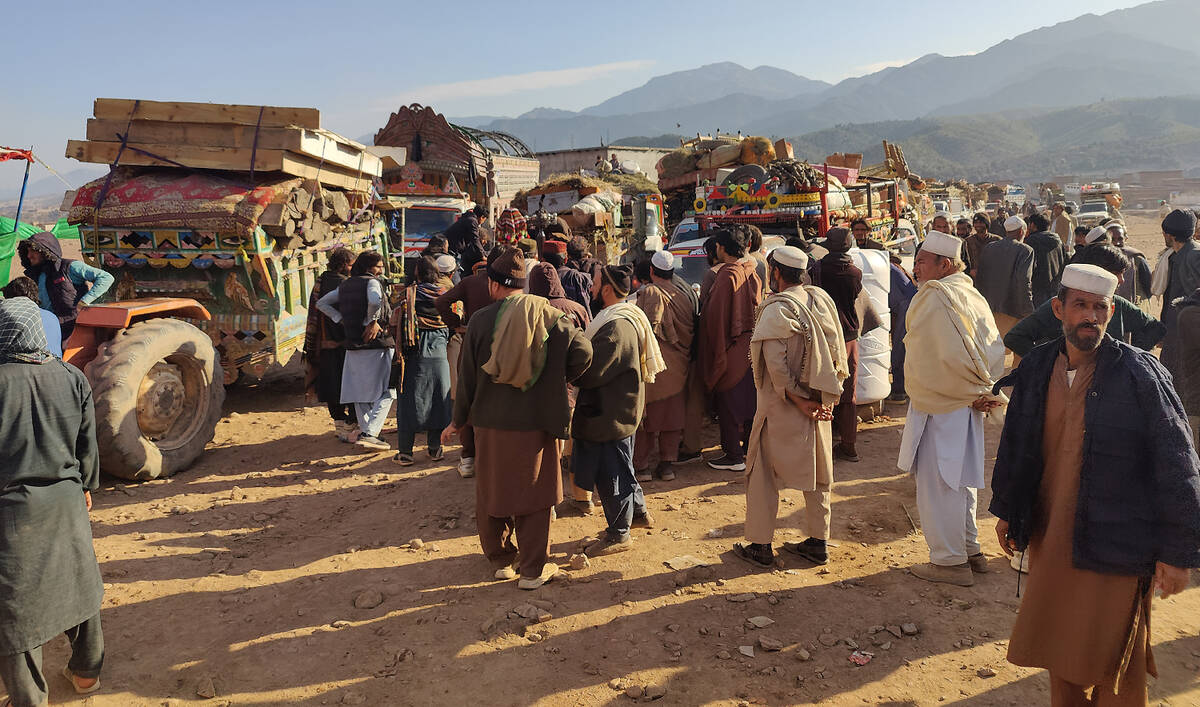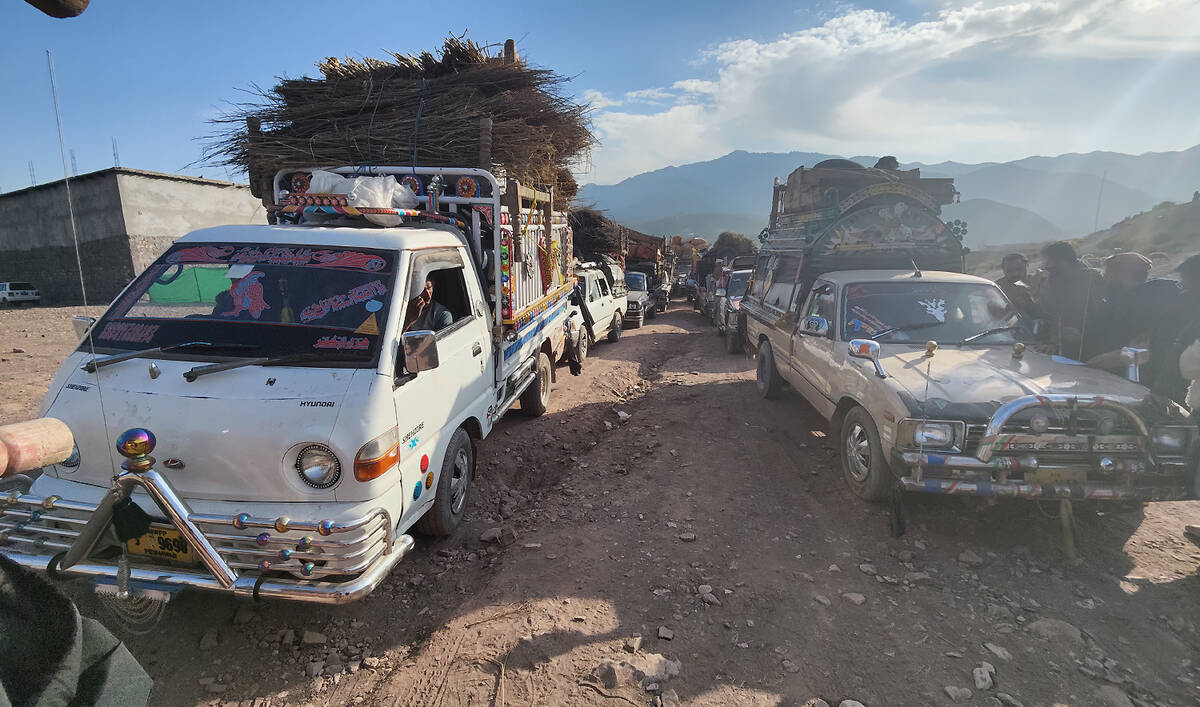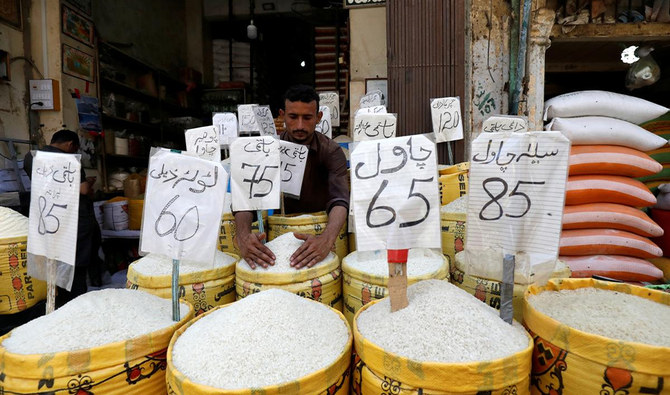ISLAMABAD: Prime Minister Imran Khan’s government faces mounting pressure as rising prices and tough austerity policies under Pakistan’s latest bailout from the International Monetary Fund are squeezing the middle class that helped carry it to power.
Rashid Mehmood owns a small shop selling children’s clothing in Aabpara, the oldest market in the capital, Islamabad. He says he has faced a critical decline in sales over the past year, pointing to Khan’s election last August.
The last six months had been “particularly harsh”, he said.
“Do you see any customers coming into my store?” he asked as he stood in his empty shop, decorated with brightly colored leggings and dresses.
He said had not made a sale in a week.
In normal times, Mehmood’s store serves the kind of middle-class shoppers who in recent years have been behind an import-led consumption splurge that propped up growth and helped hide the problems of an economy riddled with inefficiency and without a strong export base.
Fed by low-interest rates, heavy borrowing and an over-valued rupee currency that, for a time at least, allowed imports to pour in, consumption gave an illusion of growth that has now been replaced by a severe economic hangover.
Like so many of its predecessors, Khan’s government, which came to power vowing to root out corruption and create millions of jobs, has been forced to turn to the IMF to prevent a balance-of-payments crisis as the money runs out.
Economic growth, which reached 5.5% in the fiscal year to June 2018, is expected to slow to 2.4% this financial year, according to IMF estimates, barely enough to keep pace with the growth in a population that now numbers 208 million.
The rupee has lost about a quarter of its value in a slide that has driven up fuel costs and helped push a relentless increase in prices for food and other necessities.
The central bank, which this week raised interest rates to 13.25%, expects inflation to average as much as 12% this year.
As ever, the poorest have been hit hardest. But the squeeze on middle-income households poses a special challenge for Khan, who has enjoyed wide support among an urban middle class that has grown over the past two decades as poverty levels have come down from two thirds of the population to about a quarter.
Further along in Aabpara market, Abida Jahan has come with her family from Haripur town, a couple of hours drive away, after the food-processing factory her husband worked in was shut down. They are looking for a gift to celebrate their daughter’s 13th birthday.
However, the surge in prices has meant that they will likely go home empty handed.
“This is the same government that promised to decrease oil prices to 45 rupees,” says Abida’s husband, recalling that Khan’s PTI party had promised to halve the price of fuel and build a new welfare state.
SHOPPING MALLS
Pakistan’s growing middle class has helped reshape its urban landscape, symbolizing a promise of upward mobility.
Shopping malls with foreign retail brands and fast-food franchises have proliferated in recent years, serving a middle class who “define themselves by what they can buy and where they can eat”, says Ammara Maqsood, author of The New Pakistani Middle Class.
In the first decade of the century, economic growth fueled by privatization led families to a new prosperity marked by their ability to buy a motorbike, rent a home or send their children to private school.
Now businesses supplying consumers with everything from mobile phones to clothing, motorbikes and cars bought on hire purchase are feeling the squeeze.
“It’s a multiple effect,” said Fatima Azim, chief executive of Azim Motors, which has a joint venture with Japanese car maker Suzuki Motors supplying small cars and motorbikes to mainly lower-middle-class customers.
“Income has not increased at all so no matter what, if they are going to a shopping mall or wherever, they are being affected,” she said.
The government has placed the blame squarely on the corruption of past governments, notably that of former Prime Minister Nawaz Sharif, who championed big infrastructure projects that spurred growth but drained currency reserves.
Sharif is now serving a seven-year sentence for a corruption conviction he said was politically motivated.
How convincing the government’s argument will be as the crisis bites remains to be seen and a nationwide strike by wholesalers and traders last weekend gave some taste of the growing unhappiness.
“Let’s be honest, it feels like we are the ones who are being punished for forcing out the crooks,” says Fawad Subhani, who owns a domestic appliance store in Islamabad.
“They were thieves, but they were thieves who also had money and friends with money.”
Pakistan price squeeze hits middle class as well as poor
Pakistan price squeeze hits middle class as well as poor

- A $6 billion IMF bailout with stringent conditions has led to rising prices and tough austerity policies
- Economic growth, which reached 5.5% in June 2018, is expected to slow to 2.4% this year
Tirah Valley residents flee homes ahead of Pakistan’s planned anti-militant army offensive

- Families flee militant-hit region on days-long journeys amid bitter winter cold
- Cash aid announced but displaced residents cite lack of evacuation planning
PAINDA CHEENA, Pakistan: In the rugged mountains of Pakistan’s Tirah Valley, long lines of tractor-trolleys and mini-pickups inched toward a registration camp earlier this month.
The vehicles were stacked with bedding, food supplies and families escaping their homes as a military operation against militants looms in the conflict-striken northwestern region.
At the Painda Cheena registration point, 60-year-old Hajji Muhammad Yousuf sat wrapped in a shawl, waiting with dozens of others after traveling nearly 40 kilometers from his village in Maidan Tirah, a journey that took four days instead of the usual few hours. He still faces another 66-kilometer trip to Bara, near the northwestern city of Peshawar, the provincial capital of Khyber Pakhtunkhwa.
Like thousands of others, Yousuf is leaving behind a fully furnished home ahead of an expected security offensive in the volatile border region near Afghanistan.
“Today is our fourth night here,” Yousuf said. “We have left fully furnished houses behind ... There are no facilities, no amenities for us. We are facing great hardships.”

Officials say the evacuation could affect up to 20,000 families, marking a significant escalation in Pakistan’s campaign against the proscribed militant group Tehreek-e-Taliban Pakistan (TTP). Despite major military operations in the mid-2010s, Tirah Valley has remained a stronghold for insurgents, prompting authorities to plan what they describe as a targeted clearance.
The scale of displacement has placed acute pressure on limited local infrastructure. While the journey from Maidan Tirah to the registration point at Mandi Kas normally takes around two hours by vehicle, congestion and verification procedures have stretched the trip into days for many families.
“Last night, a woman died of hunger in Sandana,” Yousuf said. “There is no arrangement for medicine, no doctor, no food, no washroom. Women and children are facing problems.”
Displaced residents say they feel trapped between militant threats and state action.
“We ourselves are opposing terrorism, yet we do not understand why, if a Taliban comes in the evening and we give bread, the government comes in the morning asking why the bread was given,” Yousuf said. “In the end, we were forced to do this [to leave].”
RELIEF MEASURES
The Khyber Pakhtunkhwa (KP) provincial government has announced a compensation package for displaced families. Talha Rafi, assistant commissioner for Bara, said authorities had set up 15 biometric counters at the registration site.
“One person receives a one-time compensation of Rs255,000 ($911), and a monthly Rs50,000 ($179) is provided,” he said, adding that SIM cards were being issued to ensure digital disbursement of funds.

Provincial officials say the payments are intended to cover basic needs during displacement, though residents and tribal elders argue that cash alone cannot offset the absence of shelter, health care and transport arrangements during evacuation.
The evacuation has also exposed tensions between the provincial government and Pakistan’s military establishment over the use of force in the region.
“We have neither allowed the operation nor will we ever allow the operation,” KP Law Minister Aftab Alam Afridi said, arguing that past military campaigns had failed to deliver lasting stability.
“These people are our own people. They are also the people of this state, the people of this province. We will definitely take care of them,” he said, adding that the KP cabinet had approved what he described as “a large package” for the displaced families.
Federal authorities and the military have signaled a firmer stance. While Federal Information Minister Ataullah Tarar and the military’s public relations wing did not respond to requests for comment, military spokesperson Lt. Gen. Ahmed Shareef Chaudhry has previously defended security operations as necessary.

In a recent briefing, Chaudhry said security forces carried out 75,175 intelligence-based operations nationwide last year, including more than 14,000 in Khyber Pakhtunkhwa, attributing the surge in violence to what he described as a “politically conducive environment” for militants.
Analysts say political divisions have allowed the TTP to regain ground.
Peshawar-based journalist Mehmood Jan Babar said many militants now operating in Tirah are local residents who returned after refusing settlement offers in remote parts of Afghanistan.
“Whenever we have seen division at the national level, the Taliban have taken advantage of it,” he said.
But for families waiting in freezing conditions at Painda Cheena, such strategic calculations offer little comfort. Tribal elders accuse civil authorities of ordering displacement without adequate logistical planning.
“The government has, without any administrative arrangements, ordered these people to migrate,” said Muhammad Khan Afridi, an elderly local resident. “You yourselves are seeing what suffering these people are facing, what humiliation they are experiencing.”
As a January 25 evacuation deadline approaches, uncertainty dominates daily life for those uprooted.
“Bringing peace is in the government’s hands,” Yousuf said. “It is up to them whether they normalize the situation or drive us out again tomorrow.”










